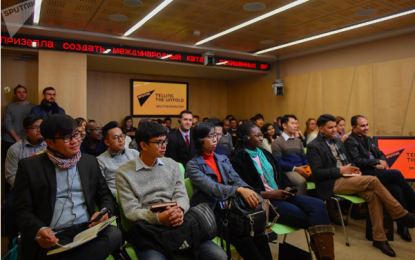
Photo from sputniknews.com
MOSCOW -- It does not matter whether journalists works for state-run media or private media, what matters is that journalists are honest with themselves and believe in the importance of what they do.
This was the point raised by Anton Anisimov, Head of International Broadcasting in Moscow-based Sputnik News Agency and Radio during the recently concluded training session for young journalists from over 30 countries at the news agency’s headquarters in Moscow, Russia.
Participating countries include state-run and private news agencies from Thailand, Cambodia, United Arab Emirates, Tunisia, Afghanistan, Lebanon, Sudan, Indonesia, Uganda, Korea, Bangladesh, Vietnam, Macedonia, Mongolia, Bulgaria, Italy, Serbia, Croatia, Pakistan, Algeria, Tanzania, Nepal, Greece, Morocco, China, Iran, Egypt, Malaysia, Malta, and the Philippines, which is participating for the first time this year.
The four-day session, held from Oct. 28 to Nov. 1, involved lectures on modern multimedia news agencies, trends in the global media industry, and challenges encountered by journalists, among others.
Anisimov explained that although there was an impression that state-run media favored pro-government stories while private media had freedom to be oppositional, this is not always the case.
“At some point in time, people start to believe that a private media corporation is way more honest than a governmental one, but every media outlet has their own agenda,” Anisimov said.
He explained that it is not uncommon there are cases of rich, powerful businessmen who can afford to buy newspaper companies, websites, and TV stations to use media to their advantage.

“Let’s say for an example, you’re an oligarch and you run some sort of energy business. At some point, you decide you want to do a political career. You need to buy media,” Anisimov added.
He, however, said although it was impossible to attain complete objectivity, the importance of a journalist believing in their work should not be underestimated.
“One thing we’re telling all the aspiring journalists that come and say that we want to work for Sputnik, make sure that what you believe in is in accord with what we do. Otherwise you’re going to have some sort of internal conflict because you’ll be getting [paid] for doing something that you do not really believe in,” Anisimov said.
Anisimov further noted that it was expected of Sputnik, being a government-funded news agency, to prioritize stories beneficial to the Russian Federation.
“It’s not a matter of being 100 percent objective, because it’s impossible. You as a journalist, as a human being have your own beliefs--you have a certain small bias that will come out no matter what you do,” Anisimov said.
“The best thing you can do is find a mass media you agree with--that when you go and work with the mass media, you believe in what you do. Be it a governmental one or private one, if you believe in what you do, you’ll still be okay,” he added.
Anisimov, meanwhile, denied tags that Sputnik reports are “Kremlin-propaganda.”
“We’re not being censored in terms of the angles that we pick. The government is being pretty liberal towards our foreign broadcasting,” Anisimov said.
Aside from Anisimov’s lecture on “How a modern multi-language news agency works,” other lectures included “Video content as a modern way to present information” by Olga Anisimova, “Journalist’s field work: main difficulties” by Vera Kostamo, and “Digging out the truth: practical lessons” by Oleg Dmitriev and Oleg Shchedrov.
Sputnik is one of the largest international media companies offering country-specific and regional multimedia websites in 32 languages, analog and digital radio broadcasting in Russian, English and French in 130 cities and online, according to its website.
It delivers 24/7 content to leading international media around the world in English, Arabic, Spanish and Chinese. (PNA)
